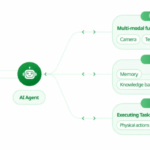
For those over 50 and gainfully employed, a new study says you have a 56% chance that you’ll be let go before you’re ready to retire, risking substantial income loss. The study supports my own observations via client work that there is no real job security, only “career security.” In a sense employees are really all consultants.
But not to worry! Here’s a list of things you can do to both minimize the risk of an unwanted departure and set yourself up for a quick, positive transition if necessary.
Build a strong network now (both inside your company and externally) and keep your skills cutting edge. If you need to make a job change quickly, the network you’ve invested time in cultivating will be invaluable. As this article explains, the keys to quickly building and leveraging a network include:
- Thinking expansively about your network: it’s much bigger than the handful of people you talk with every week. It includes your family, your friends, people you worked with 15 years ago but lost touch with, former professors or classmates, your dentist and so on.
- Keeping in touch: Being a good networker is not just about being good at meeting people or connecting on LinkedIn. True networking is about building a real relationship, one where they would be open to helping you and you would be open to helping them.
- Geting to know everyone in your LinkedIn 1st degree network. LinkedIn makes it easy to keep in touch via updates posted on your home page feed. But if the people you’re directly connected with consist of mostly strangers, then your updates will not be meaningful to them, nor theirs to you.
Show your value: demonstrate leadership on the job. Leaders, i.e. those that take initiative, have a vision for a better way, influence others to get on board, and show results, are usually the last to be let go. And you can lead from any level in an organization; you don’t need to manage staff to be a leader!
Have a powerful “pitch” at the ready to share your value: a five second version for chance encounters at work, a 30 second version for networking situations, and a two-minute version for interviews. You might be thinking “five seconds?!” Yes! As I explain in my book Peak Presentations (the “Pitch” chapter), when your boss or someone important to your career asks “How are you?” Have a great career-advancing answer at the ready, e.g. “Things are fine now that I’ve finished the X project.” A client of mine used a similar five second pitch to leverage a chance encounter with a senior executive into a career-making assignment at her company.
Address problematic work relationships with key stakeholders, and most importantly with your boss. Even if you think you’re great at your job, if you’re boss isn’t thrilled (or important people don’t care for you), you can be on thin ice. Sometimes the fix is as simple as saying good morning or grabbing a coffee. Other times it’s harder. Yet there may be ways to improve even these more challenging situations. This article shares one such technique, involving “Active Listening.”
Be very aware of what’s happening around you. Listen to the gossip (don’t contribute) and know what’s going on in your industry and within your organization. Keep one step ahead of developments that could lead to an involuntary exit.
Address the root causes of age discrimination. In a job search what may appear to be age discrimination often ends up being: a) they think you’ll want too much money, b) they think you won’t work as hard as younger employees, that you’re just coasting into retirement or have less energy, or c) they think you might not “fit in” e.g. feel comfortable reporting to someone a lot younger than you.
You can proactively address all of these issues the same way: by showing enthusiasm for the role, the department, the company, their vision and the people you meet. In all of your communications, use specifics to demonstrate that you’re highly motivated before, during and after an interview. Keep the focus on how you can help them (that is, not how you would be eyeing your younger boss’s job), including saying things like “how can I be of the most help to you?”
[“source=forbes”]





















































